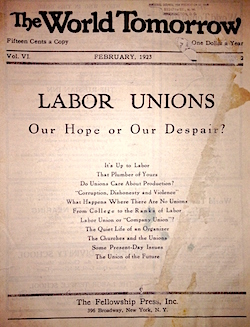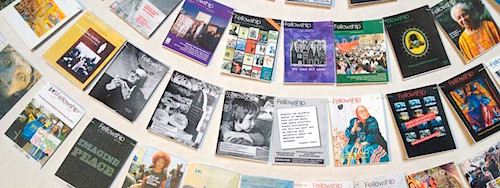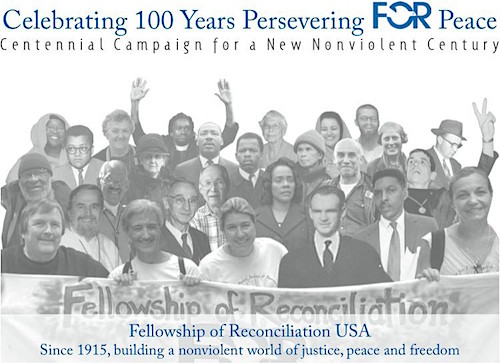Friends,
|

A 1923 issue of FOR's journal, then called The World Tomorrow, on the role of labor unions in social justice.
|
Since FOR's founding in 1915 during World War I, members have believed that it is not enough to merely avoid war, but that it's essential to remove the causes of war and create a new social order rooted in dignity and freedom for all.
Economic justice has always been a prominent concern of FOR's members.
At an early FOR gathering the first national chairman of the American Civil Liberties Union, Harry Ward, spoke on "Industrial Reconciliation: Its Meaning in the Present Day," and labor organizer Elizabeth Gurley Flynn spoke in defense of civil liberties.
After World War I, FOR members sought to assure unemployed munitions workers of a living wage and actively courted labor as an ally in the struggle against war. FOR's unemployment committee reported, "There is poverty and lack of vigorous production today because the world after an orgy of destruction is poorer in human material, as well as in the raw material and the machinery for production."
In the earliest issues of FOR's magazine when it was entitled The World Tomorrow, members advocated representative government in industry, the organization of workers on a national scale, expansion of the cooperative movement, public ownership and control of resources, universal extension of the minimum wage, and taxation to control unlimited wealth.
This November, come see an exhibit of more than one thousand covers from The World Tomorrow and Fellowship at Union Theological Seminary in New York City! Free and open to the public, with a free opening reception on Thursday, Nov. 5.

A.J. Muste, a prominent labor organizer and FOR executive secretary, characterized FOR's role in the class struggle in his address to the FOR National Council in 1929:
"The Fellowship of Reconciliation envisions as the goal of the history of the kingdom of God, an order of society in which there shall be no master and no slave, no exploiter and no exploited; where each human being shall be regarded as an end in himself; where each shall contribute according to his ability; and each shall share according to his need; an order of society based on cooperation, not on competition and strife; where fellowship shall be a reality and not a lovely dream or a pious wish."
Motivated by the goal of creating the beloved community, FOR's staff and national council consistently linked three themes when establishing priorities: work for disarmament, work against racism, and work against economic injustice.
 Help us celebrate our 100-year history of working for peace with justice! Help us celebrate our 100-year history of working for peace with justice!
Nov. 6: FOR Centennial film, with reception, at Shadowcliff in Nyack, NY
Nov. 7: A multifaith service, reception and dinner at Riverside Church in New York City
Next summer: A national FOR conference, in concert with Western Washington FOR and Oregon FOR, in Seabeck, WA
And on this Labor Day weekend, we encourage you to continue in FOR's century-long work to build economic justice through active nonviolence and reconciliation.
In our hands is placed a power greater than their hoarded gold,
Greater than the might of armies, multiplied a thousand-fold.
We can bring to birth a new world from the ashes of the old,
For the union makes us strong!*
Solidarity forever,
 Linda Kelly Linda Kelly
Director of Communications
Fellowship of Reconciliation
* "Solidarity Forever" is perhaps the most famous union anthem. It was written by Ralph Chaplin in 1915. |